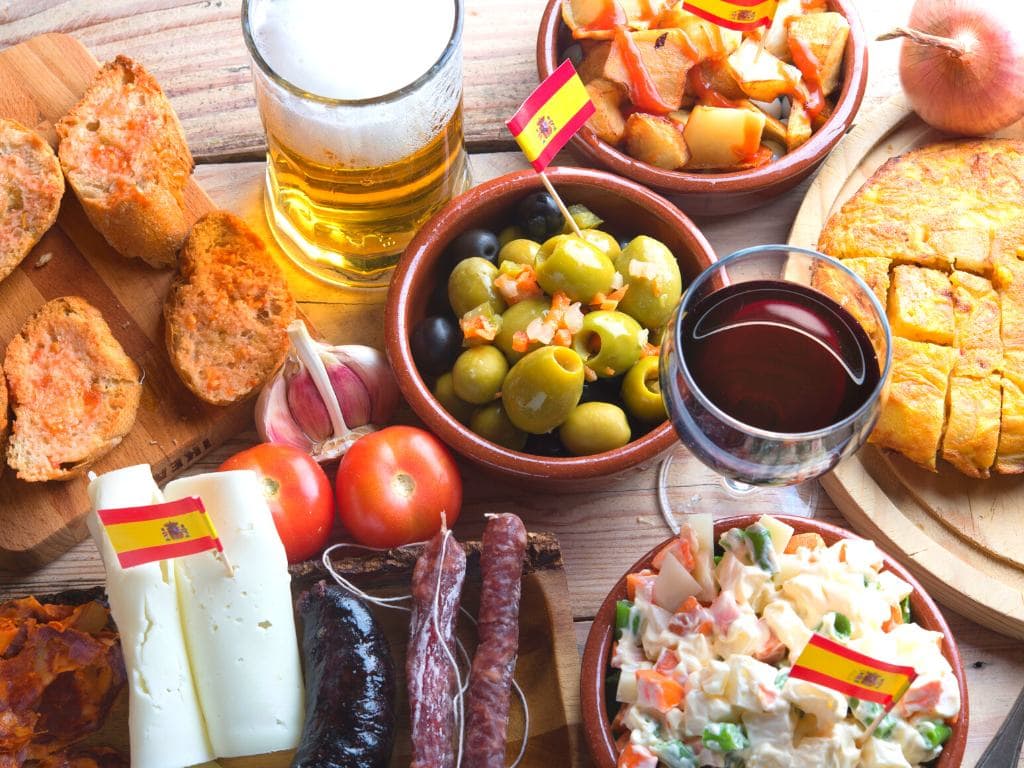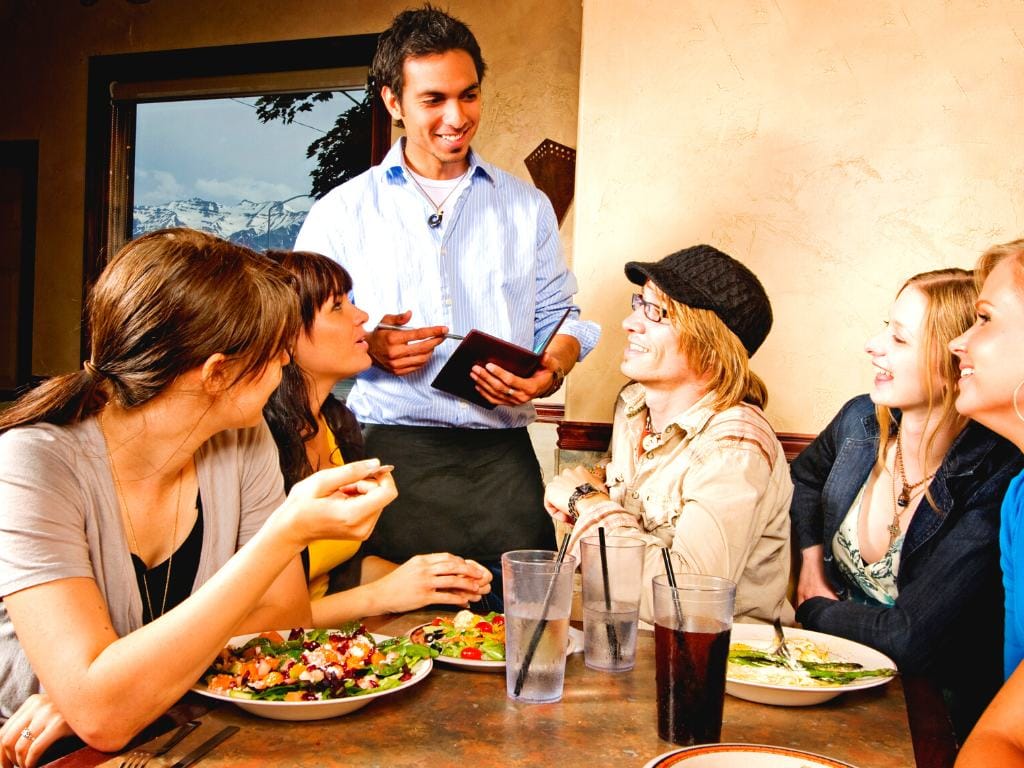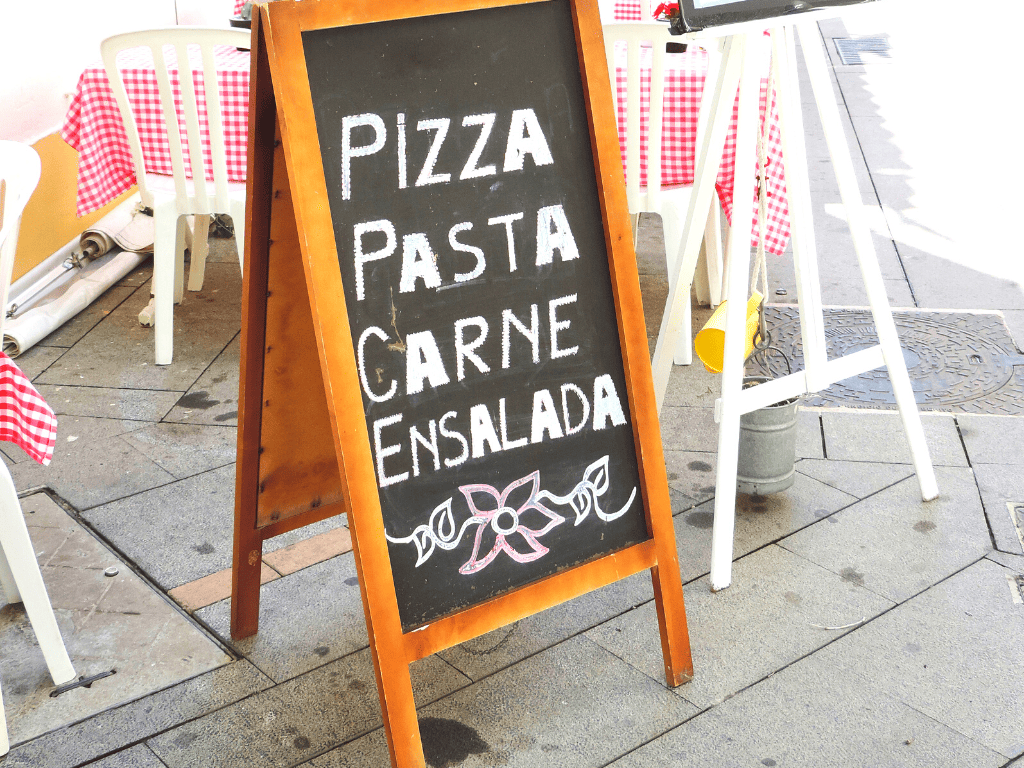What Does the Spanish “Buen Provecho” Mean in English?
What does “Buen Provecho” mean in English? When should you say “Buen Provecho”—if at all? Read to find out!
Have you ever eaten at a Spanish restaurant or found yourself in the company of Spanish speakers during mealtime and heard the phrase “Buen Provecho?”
Whether you’re learning Spanish, planning a trip to Spain, or simply curious about table manners in Spanish-speaking countries, you’ll want to know the “Buen Provecho” translation!
As a former Spanish teacher who has lived in Spain, I’ve experienced firsthand the use of this phrase. (I’ll share what I’ve learned with you in this article.)
By the end of this post, you’ll understand the meaning of “Buen Provecho”, explore when and where to say it in a culturally-appropriate manner, and learn how to respond to “Buen Provecho.”
What Does Buen Provecho Mean?

When it comes to the question, “What does the Spanish saying Buen Provecho in English?” the answer is a little more complicated than you might expect. Let’s see why…
The phrase, Buen Provecho, is closest in meaning to “Bon Appétit.” You probably already know that “Bon Appétit” is a French saying English speakers frequently use to wish everyone a good meal.
Even though these two phrases are used similarly, their literal translations are different. Whereas “Bon Appétit” translates to “Good Appetite,” “Buen Provecho” carries a little more weight.
In Spanish, buen means “good.” Provecho translates to “benefit,” “profit,” or “advantage.” That means the literal translation in English would be akin to “good benefit” or “good profit” or even “good advantage.”
Buen Provecho, therefore, is something Spanish speakers say to express their desire for everyone to have a good meal, one that’s nourishing and profitable to them—in terms of the meal, the dining experience, and the company!
Example:
— ¡Buen Provecho! Estoy muy contento de que todos ustedes puedan acompañarnos hoy.
— Enjoy your meal! I’m so glad you all could join us today.
The Real Academia Española (RAE), the institution charged with safeguarding the Spanish language, defines it this way: Buen Provecho is a Spanish phrase used “to express the desire that something be useful or convenient to someone’s health or well-being, frequently addressing those who are eating or drinking.”
All that said, the best English translation for ¡Buen Provecho! is:
- “Enjoy your meal!”
- “Enjoy!”
- “Have a good meal!”
- “Let’s eat!”
- “Dig in!”
How to Pronounce Buen Provecho in Spanish
In Spanish, Buen Provecho is pronounced bwehn-pro-BEH-choh.
When and Where to Use Buen Provecho

Knowing when to say “Buen Provecho” is just as important as understanding its meaning. While the phrase is used in the context of mealtimes, its application can vary due to the cultural nuances of the country you are visiting.
Let’s take a closer look at when and where you should say “Buen Provecho:”
At the Start of a Meal
“Buen Provecho” is said at the beginning of the meal. This may be after drinks or appetizers—whenever everyone has their meal and is just about to start eating.
The phrase kicks off a meal, in other words. It’s a way of saying, “Everyone, it’s time to start eating.” Some even say it’s like shouting, “Dig in!”
You may say this phrase any time you eat, be it at breakfast, lunch, or dinner.
You will also hear it in both formal and informal situations, whether with family or guests.
In Restaurants
In restaurants, waiters will typically say “Buen Provecho” after they’ve delivered food to the table.
If you’re in a group, the host (or someone in the group, if the occasion is less formal) may say it as well.
Note: In Spain, it’s common to hear “Buen Provecho” in restaurants only, but Mexicans use the expression more broadly. You’re likely to hear it exchanged among friends, between strangers seated nearby, and from waiters to customers.

At Home and Social Gatherings
If you’re invited to someone’s home for lunch or dinner, “Buen Provecho” can be seen as a gesture of hospitality. It signifies that the host wants everyone to enjoy the food they prepared and enjoy the time they are spending together at the table.
It’s important to note that you should wait until the host says “Buen Provecho” before responding or starting to eat. It would be awkward if you were the one wishing everyone a good meal when you didn’t invite others over!
(That stated, if you’re with family in an informal setting, it wouldn’t really matter who says it. Read the room!)
When You See Someone Eating
In Latin American culture, it’s customary to wish someone “Buen Provecho” or simply “Provecho” whenever you see someone eating, even strangers!
(Perhaps that’s even how you found this blog post. You’re sitting alone about to dig into your Puerto Rican sandwich in Old San Juan, and someone has randomly (well, randomly in your mind) said, “Provecho.”)
You may experience this in a restaurant when you make eye contact with someone as they are leaving, as you are sitting and eating your lunch at work, or when you’ve just bought some ice cream from a street vendor and are about to take the first lick!
It’s a polite way of wishing someone a good meal while also saying “Keep eating, I don’t mean to interrupt you.”
Other Ways to Say Buen Provecho in Spanish

While “Buen Provecho” is the most common way to wish someone a good meal in Spanish, there are a few other expressions you can use to convey a similar sentiment. Here are a few:
¡Que Aproveches!
¡Que Aproveches! shares a similar meaning as Buen Provecho. It’s widely used in Spanish-speaking countries, and is much more common in Spain than the more formal, “Buen Provecho.” (Spain is a rather casual country in contrast with Latin America.)
The verb “aprovechar” means “to take advantage of” or “to make the most of.” In this case, aprovechar is used in the present subjunctive with the word “que” in front of it. This is meant to show desire, hope, or wish.
— Que aproveches la comida y obtengas energía para el día.
— May you enjoy and get energy for the day.
¡Que Aproveches! is like saying I hope you have a good meal. Using it also implies that you should make the most of this meal right now because tomorrow isn’t promised to us.
¡Provecho!
In addition to ¡Buen Provecho!, the concise ¡Provecho! is a common way to wish someone an enjoyable meal.
— ¡Provecho! Vamos a comer.
— Let’s eat! We’re starting the meal.
All in all, you don’t have to use the word “buen” in front of “provecho” to be understood in Spanish. After all, benefits are innately positive!
Both versions are used throughout Latin America. In Mexico, you can also use the diminutive, “Provechito.”
¡Buen Apetito!
Similar to “Bon Appétit,” the Spanish version, “Buen Apetito” is sometimes heard in Spain and Latin American countries.
This phrase (literally, “good appetite”) is another way to wish someone a satisfying meal.
— ¡Buen Apetito! Espero que te guste el pescado.
— Enjoy your meal! I hope you like the fish.

¡Disfruta tu Comida!
A more literal way to say, “Enjoy your meal!” is to use the verb “disfrutar.” Disfrutar means “to enjoy” in English.
While you won’t get to show off your Spanish as much with this one, this sentence is universally understood and used across Spanish-speaking regions.
— ¡Disfruta tu comida! Es hora de cenar y de conversar.
— Enjoy your food! It’s time for dinner and the conversation.
¡A Comer!
In many Spanish-speaking households, you might hear “A comer!” as a call to start the meal. When I studied abroad in Spain in college, my host mom always said this to get us to come to the table.
It more or less means:
- “It’s time to eat!”
- “Come, and eat!”
- “Eat!”
This is an invitation to dig in. Don’t wait, because the food will get cold. It’s frequently used in casual, family dining settings across Spanish-speaking countries.
¡Salud!
“¡Salud!” literally means “health.” Saying this is a way to wish someone good health while raising your glass in a toast.
Typically, you’ll want to say cheers or give a toast in Spanish when everyone gets their drinks and before taking the first sip.
However, you might interrupt the meal to give a toast, especially on special occasions like at a wedding or anniversary party.
In any case, Salud! it’s universally understood and used across Spanish-speaking regions.
How to Respond to Buen Provecho

When someone wishes you “Buen Provecho” before a meal, it’s courteous to respond in some way to acknowledge and share in the sentiments of the moment.
In this section, we’ll review some natural ways to respond to “Buen Provecho” in Spanish. Keep in mind, however, it’s not necessary to stress over finding the perfect response. A simple smile or nod is better than ignoring the gesture!
Provecho (Enjoy)
The easiest way of responding to “Buen Provecho” in Spanish is to simply say the same thing back (in the case of Buen Provecho, Provecho, or Que Aproveches). Or, you could say the shortened version, “Provecho.”
Please note that you should only respond with this if you’re talking to others who are sharing the meal with you. It would be weird if you wished your waiter a good meal, for instance!
You could also say, “Buen provecho a todos” if dining with a group. This response (Enjoy your meal, everyone) emphasizes good wishes for everyone present.
Igualmente (Likewise)
A simple and gracious response, Igualmente means “likewise” or “the same to you.” This reflects the wish for a good meal back to whoever extended it.
You can also spice it up a bit by adding a few words:
- “Gracias, igualmente.” (Thank you, likewise.)
- “Igualmente, que tengas un buen almuerzo.” (Likewise, may you have a good lunch.)
- “Igualmente, que aproveches.” (Likewise, may you take advantage.)
Gracias (Thank You)
To respond to someone who isn’t eating (a waiter, for instance), respond with a straightforward “gracias” (thank you).
You could also say, “Te lo agradezco” (I appreciate it) which is a polite way to express appreciation for the mealtime wishes.
What Does Buen Provecho Mean in English: FAQs
Still have questions about the meaning and usage of Buen Provecho? We’ve got you covered with some frequently asked questions:
Are there regional variations of Buen Provecho?
Yes, there are other ways to say Buen Provecho like Que aproveche/s or Provecho. While the sentiment is nearly the same, the use may vary in different countries or regionally within the same country.
Can you say Buen Provecho in other languages?
Yes, many cultures have similar expressions to Buen Provecho. For example, in French, it’s Bon Appétit, in Italian, Buon Appetito, in German, Mahlzeit, and in Arabic, Bismillah. These phrases are all used in a similar way to convey a desire for an enjoyable meal.
What language is Buen Provecho?
Buen Provecho is Spanish. It’s used in Spanish-speaking cultures before meals as a way of saying, “Enjoy your meal.”
Do Spaniards say Buen Provecho?
Yes, Buen Provecho is used in Spain, but Que Aproveches is more common. Both are a way to wish someone a good meal and reflect Spanish hospitality.
What do Spanish people say before eating?
Spanish people commonly say Que aproveches (conjugated for the person to whom they are speaking) before eating to extend the sentiments for a nourishing and joyful meal. Buen Provecho is also heard in more formal settings like restaurants.
What does “A buen tiempo” mean, and how is it related to “Buen Provecho”?
“A buen tiempo” is Dominican Spanish for “at a good time” and is sometimes confused with “Buen Provecho.” “Buen Provecho” is a wish for a good meal, while “A buen tiempo” relates to timing and readiness. It’s similar to saying, “You’re just in time! Join us! There’s plenty for everyone!”
Last Thoughts on Buen Provecho Meaning

Remember that “Buen Provecho” is more than just a phrase. Incorporating “Buen Provecho” into your interactions with Spanish-speaking communities can enhance your travel experience while showing respect for local customs!
Of course, you’ll want to learn to compliment food in Spanish, too.
More Articles on Spanish Language & Culture
Looking for more articles in preparation for your next trip to Spain, read these. ⤵
